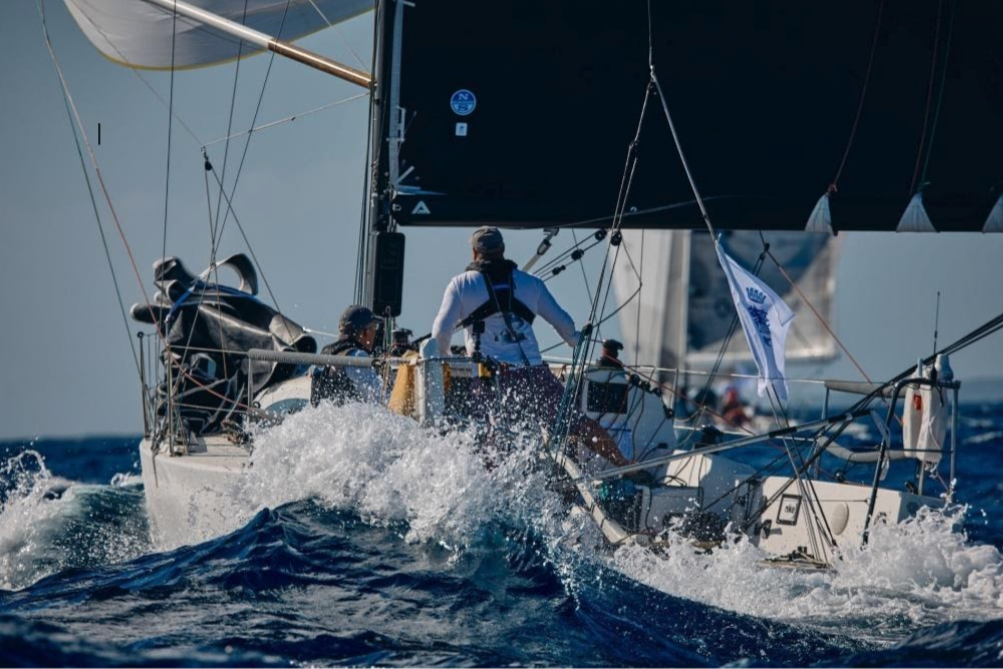Current Holders Battle it Out Double Handed In International Fleet in the RORC Trans-Atlantic Race
British Sailing article - Written by Kate Cope
Richard and Jeremy at the start of the 2022 RORC Transatlantic Race - Image by James Mitchell
One of the top offshore yachts in the UK is currently Mid-Atlantic vying for a top spot in the most competitive international fleet to race the Atlantic possibly ever and they just have two persons aboard. The Royal Offshore Racing Clubs Transatlantic race is a 3000NM race that has attracted 30 ocean racing boats ranging from 32ft to 100ft and started on the 8th January from Lanzarote with the finish in Grenada. The long-term duo partnership Richard Palmer (58) and Jeremy Waitt (48) won the last edition of the race two years ago and were the first ever to win the massive trophy as a double handed pairing. Racing on Jangada, the smallest boat of the fleet, the pair have been creeping up the leader board. Jeremy said “Early on the winds favoured the bigger faster boats. However, now the big boats have hit some lighter winds it is giving us a chance to battle back”
The race has become one of the premier ocean sailing events and for sailors it is a marathon type event that will take the pair 17-20 days and nights.
Richard said “Jangada is performing well so far all systems are running as expected. With only satellite data systems to get weather updates on we are always needing to ensure our small crafts systems work, it’s taken a huge amount of preparation to be ready to race. It's getting exciting as we close up to the top of the leader board and we hope we can continue to push for a top spot. The level of competition is immense racing against ocean going machines like Comanche and Volvo 70's makes the task a tough one”.
Jeremy said “It’s such a privilege to be racing in the ocean like this, the moonlight dancing of the wave tops and vast expanse of this ocean is stunning. As I write we are surfing down large waves at high speeds with the spinnaker and the conditions have been tough. Being two handed makes things pretty tough and sleep deprivation can make it really hard. Alongside lack of sleep each of us must manage the boat for long periods whilst the other is asleep effectively single handed, there’s no doubt we have to compromise at times compared against the fully crewed boats with 6-14 people aboard. We will soon be passing the place where two year ago I fell off the boat and thankfully was retrieved by Richard, it’s a reminder of the risks involved in ocean racing.”
Richard said: Offshore racing is often a game of snakes and ladders sometimes you’re up and other times you’re down, this year the conditions are very unsettled. Tactics wise It feels like a game of musical chairs with boats having to find stronger winds or lose out in doldrum type conditions. We are studying the weather very closely and pushing the boat as hard as we can over such an extended period.'
The pair are well known to fellow sailor and double Olympic Gold medallist Shirley Robertson. Shirley comments “The Cowes pairing of Richard and Jeremy on Jangada are a force in the double handed offshore world - outstanding preparation coupled with and a partnership that’s rock solid. I’m in no way surprised that they lead this 'ultra-marathon' of a race across the Atlantic, even when exhausted they have a way of continually making good decisions, and as defending champions they know what’s needed to stay ahead”
Richard and Jeremy winning the RORC Transatlantic Race Trophy 2019 - Image by Arthur Daniel


